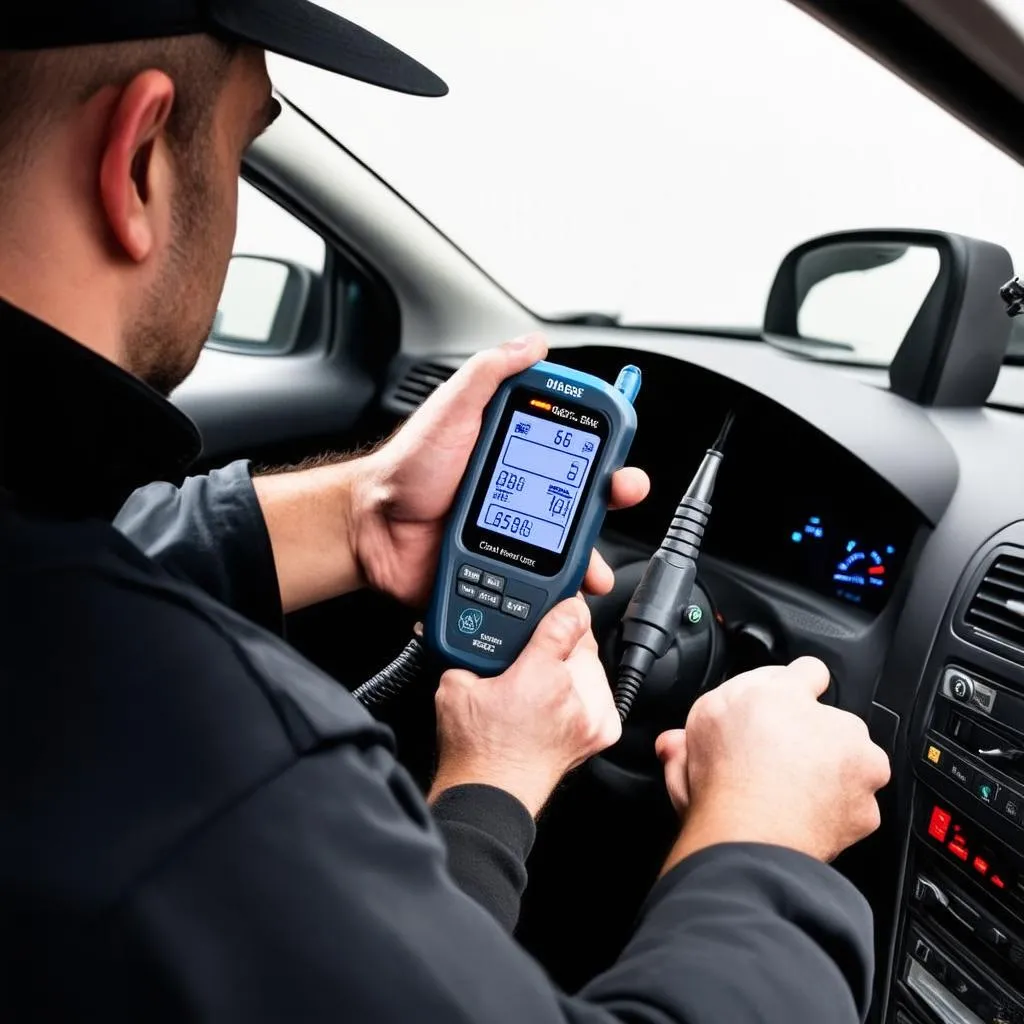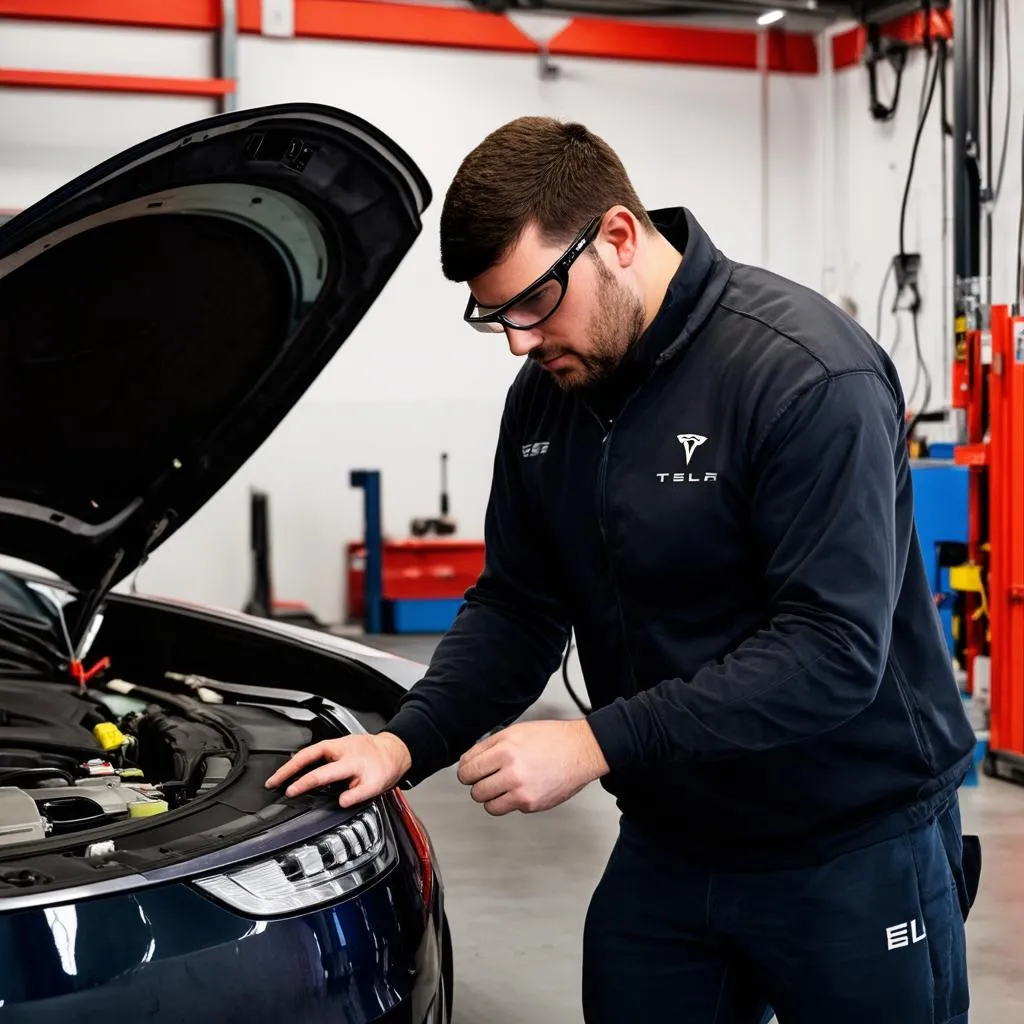“Check engine.” Two words no car owner wants to see illuminated on their dashboard. A wave of dread washes over you. What does it mean? How much will it cost? Is my car about to break down? Before you spiral into a frenzy, remember this: knowledge is power. Understanding the tools mechanics use to diagnose those cryptic engine codes can empower you to tackle car troubles with more confidence. Enter the OBD and OBD2 scanner – your key to deciphering your car’s silent language.
Decoding the Acronyms: OBD vs. OBD2
Let’s start with the basics. OBD stands for On-Board Diagnostics. Imagine it as your car’s internal computer system, constantly monitoring its health. When something goes awry, this system logs a code, much like a digital breadcrumb trail leading mechanics to the root of the problem.
OBD: The Early Days
The earliest OBD systems were rudimentary, lacking standardization. Picture a mechanic huddled under the hood, armed with a clunky device and a mountain of technical manuals, trying to make sense of blinking lights. It was a time-consuming and often imprecise process.
OBD2: The Standardized Revolution
Then came 1996, a pivotal year for both cars and frustrated car owners everywhere. OBD2 was born, ushering in a new era of standardized diagnostic capabilities. This meant:
- Universal Connector: A standard 16-pin connector located under the dashboard, making it easy to connect a scanner.
- Common Codes: Manufacturers adopted a standardized system of diagnostic trouble codes (DTCs), making diagnosis faster and more consistent.
- Emissions Focus: OBD2 placed a strong emphasis on monitoring emissions-related components, aligning with growing environmental concerns.
Think of it like this: OBD was like having a conversation with someone speaking a different dialect; you could understand bits and pieces, but communication was difficult. OBD2, on the other hand, is like having a universal translator – clear, concise, and readily understood by anyone with the right tool.
Why the Confusion?
You might wonder, if OBD2 is the standard, why do people still talk about OBD scanners? Well, the term “OBD scanner” has become a bit of a catch-all phrase. Often, people use it interchangeably with “OBD2 scanner,” even when referring to the standardized system.
 OBD2 Scanner in Use
OBD2 Scanner in Use
What Can You Do With an OBD2 Scanner?
Now, let’s talk about you – the car owner. An OBD2 scanner isn’t just a tool for mechanics; it can be your secret weapon too. Here’s how:
- Diagnose the Check Engine Light: Read and interpret those pesky diagnostic trouble codes, giving you a better understanding of the issue.
- Reset the Check Engine Light: After addressing the underlying problem, you can use a scanner to reset the light.
- Monitor Live Data: Many scanners display real-time data from your car’s sensors, such as engine RPM, coolant temperature, and oxygen sensor readings, giving you valuable insights into your vehicle’s performance.
Imagine this: Your car has been feeling a bit sluggish lately. You connect your trusty OBD2 scanner and notice the oxygen sensor readings are erratic. Armed with this information, you know exactly what to tell your mechanic, potentially saving yourself time and money on unnecessary diagnostics.
Choosing the Right Scanner
The world of OBD2 scanners is vast and varied, ranging from basic code readers to professional-grade diagnostic tools. Consider your needs and budget when making a decision:
- Basic Code Readers: Ideal for DIYers who want to read and clear codes.
- Bluetooth Scanners: Connect wirelessly to your smartphone or tablet, offering a user-friendly interface and advanced features.
- Professional Scanners: Provide comprehensive diagnostic capabilities, including live data, actuator tests, and advanced programming functions.
Think of it like choosing the right tool for a home repair project. A simple screwdriver might suffice for hanging a picture, but you’ll need a more advanced toolkit for more complex tasks.
OBD2 and Beyond
While OBD2 has revolutionized car diagnostics, the automotive world is in a constant state of evolution. Advanced driver-assistance systems (ADAS) and the rise of electric vehicles present new challenges and opportunities for vehicle diagnostics. As technology advances, we can expect even more sophisticated tools to emerge, further empowering car owners and mechanics alike.
 Modern Car Repair
Modern Car Repair
Your Questions Answered
Here are some common questions car owners have about OBD and OBD2 scanners:
1. Will any OBD2 scanner work on my car?
Almost all cars manufactured after 1996 in the United States are OBD2 compliant. However, some European and Asian models might have slight variations. It’s always a good idea to check your owner’s manual or consult with a trusted mechanic to ensure compatibility.
2. Can an OBD2 scanner tell me exactly what’s wrong with my car?
While OBD2 scanners are incredibly helpful, they’re not magical. Think of them as a starting point for diagnosis. They provide valuable clues about potential issues but don’t always paint the complete picture. Sometimes, further inspection and testing are needed to pinpoint the exact cause of the problem.
3. Can I use an OBD2 scanner to improve my car’s performance?
Some advanced scanners offer performance monitoring and tuning capabilities. However, it’s essential to proceed with caution. Modifying your car’s settings without proper knowledge can negatively impact performance and even void your warranty. Always consult with a qualified mechanic before making any significant adjustments.
Explore Further
- OBD Fusion vs. DashCommand: Delve deeper into the world of OBD2 apps and discover the differences between two popular options.
- Cheap OBD-II Code Reader: Looking for an affordable way to start diagnosing your car troubles? Explore our recommendations for budget-friendly code readers.
- Does OBD-II Odometer?: Uncover the connection between your car’s odometer and the OBD2 system.
Need Expert Help?
Feeling overwhelmed by car diagnostics? Don’t worry; we’re here to help! Our team of expert automotive technicians is available 24/7 to assist you with all your diagnostic tool needs. Contact us on Whatsapp at +84767531508 for personalized support and guidance.
The Road Ahead
Understanding your car’s onboard diagnostics is empowering. Whether you’re a seasoned DIY mechanic or a car owner who wants to be more informed, an OBD2 scanner can be an invaluable tool in your arsenal. Remember, knowledge is power, and the more you understand your vehicle, the better equipped you’ll be to navigate the road ahead.
